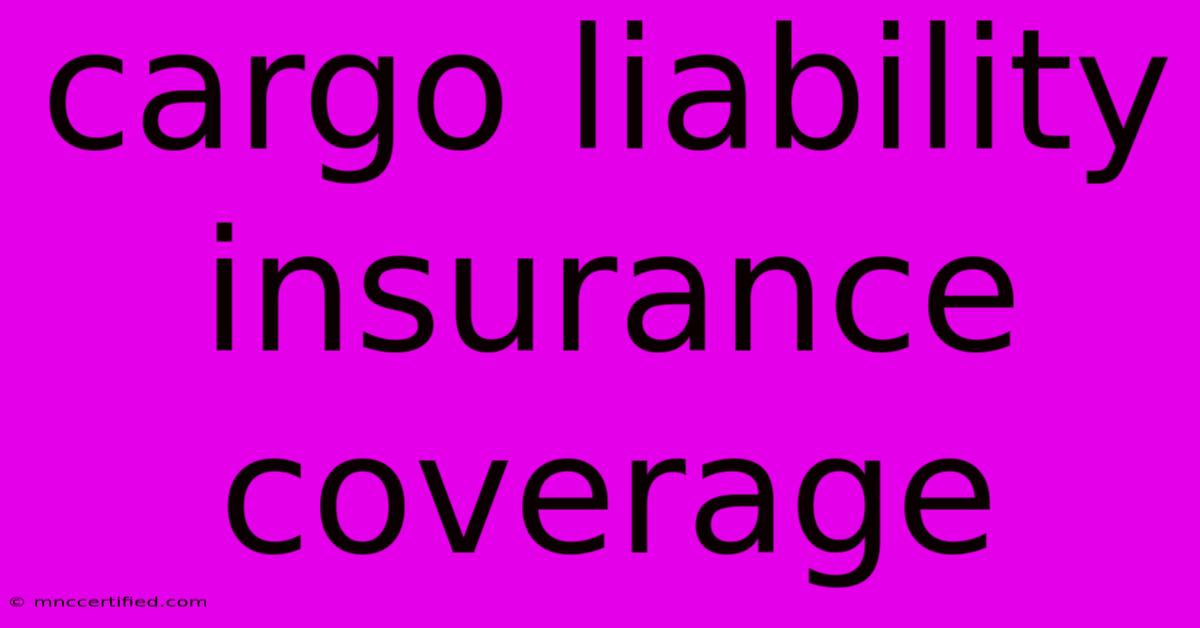Cargo Liability Insurance Coverage

Table of Contents
Cargo Liability Insurance Coverage: Protecting Your Business from Shipping Risks
Shipping goods, whether domestically or internationally, involves inherent risks. Accidents, theft, damage, and even delays can lead to significant financial losses. That's where cargo liability insurance coverage comes in. This comprehensive guide will explore the intricacies of this crucial insurance policy, helping you understand its coverage, benefits, and how to choose the right policy for your business.
What is Cargo Liability Insurance?
Cargo liability insurance, also known as carrier's liability insurance, protects businesses that transport goods against financial losses arising from damage to or loss of cargo while it's under their care, custody, or control. It's crucial for freight forwarders, trucking companies, shipping lines, and other businesses involved in the transportation of goods. Unlike cargo insurance, which protects the owner of the goods, this policy protects the carrier.
Key Differences from Cargo Insurance:
- Cargo Insurance: Protects the shipper or owner of the goods against loss or damage.
- Cargo Liability Insurance: Protects the carrier against claims for loss or damage to goods they are transporting.
Types of Cargo Liability Coverage:
The specific coverage offered by cargo liability insurance can vary depending on the insurer and the policy. However, most policies will include some or all of the following:
- Damage to Goods: Coverage for physical damage to cargo during transit, including accidents, collisions, and natural disasters.
- Loss of Goods: Protection against loss of goods due to theft, pilferage, or other unforeseen events.
- Delay in Delivery: Some policies may offer coverage for losses incurred due to delays in delivery, although this is often subject to specific limitations and exclusions.
- Legal Liability: Protection against legal costs and judgments arising from claims made against the carrier for damage or loss of goods.
Factors Affecting Cargo Liability Insurance Premiums:
Several factors influence the cost of cargo liability insurance:
- Type of Goods: The value and nature of the goods being transported significantly impact premiums. High-value or fragile goods will generally command higher premiums.
- Mode of Transportation: Premiums will differ depending on the mode of transport (truck, rail, sea, air). Air freight, for instance, often carries higher premiums due to the increased risk.
- Geographic Location: The routes used and the geographic areas involved can influence premiums due to varying levels of risk.
- Carrier's Safety Record: A carrier with a strong safety record and effective loss prevention measures will typically qualify for lower premiums.
- Policy Limits: The amount of coverage selected will directly impact the premium. Higher coverage limits mean higher premiums.
Choosing the Right Coverage:
Selecting the appropriate cargo liability insurance policy requires careful consideration of your business's specific needs and risk profile. Consult with an experienced insurance broker to determine the appropriate level of coverage, policy limits, and exclusions. Understanding the policy's terms and conditions is paramount to avoid any surprises in the event of a claim.
Benefits of Cargo Liability Insurance:
- Financial Protection: Protects your business from potentially devastating financial losses due to cargo damage or loss.
- Legal Protection: Covers legal fees and judgments arising from claims.
- Peace of Mind: Provides confidence in your operations, knowing you are protected against unforeseen events.
- Customer Satisfaction: Demonstrates your commitment to responsible and reliable transportation.
Beyond the Basics: Improving Your Risk Management
While cargo liability insurance provides a crucial safety net, proactive risk management strategies are equally important. Implementing measures such as:
- Driver Training: Ensuring drivers are properly trained to handle cargo safely and efficiently.
- Regular Vehicle Maintenance: Regular maintenance reduces the likelihood of breakdowns and accidents.
- Proper Cargo Handling: Implementing proper procedures for loading, securing, and unloading cargo.
- Security Measures: Employing security measures to prevent theft and pilferage.
can significantly reduce the risk of incidents and, consequently, insurance claims.
Conclusion:
Cargo liability insurance is not just a cost; it's an investment in the stability and long-term success of your transportation business. By understanding the intricacies of this insurance and proactively managing risk, you can mitigate potential losses and safeguard your business's future. Remember to consult with insurance professionals to ensure you have the right coverage for your unique needs.

Thank you for visiting our website wich cover about Cargo Liability Insurance Coverage. We hope the information provided has been useful to you. Feel free to contact us if you have any questions or need further assistance. See you next time and dont miss to bookmark.
Featured Posts
-
How Much Is Xray Without Insurance
Nov 16, 2024
-
Lenny Rushs Family And Friends
Nov 16, 2024
-
2030 Target Madrid Lisbon Rail
Nov 16, 2024
-
Childers Plays Cincinnati
Nov 16, 2024
-
Landman Review Sheridans Western Falls Short
Nov 16, 2024